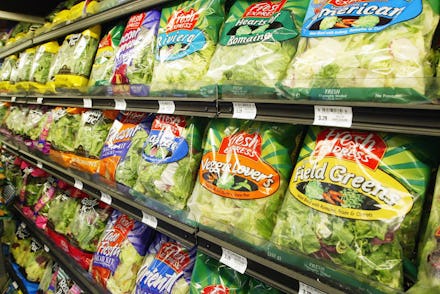Can Bagged Salad Give You Listeria? Everything You Should Know About Packaged Salad Safety

Bagged salads seemingly make everything more convenient: Having lettuce (or other greens) prewashed and precut is a total timesaver when whipping up a salad on the fly.
But the number of packaged salad recalls in the past year might make a person wonder: Are these convenient greens as safe as conventional heads of lettuce?
"They're safe," Bob Brackett, vice president and director of the Institute for Food Safety at Illinois Institute of Technology, said over the phone. "But generally there are more risks associated with precut greens." If there's contamination (like E. coli, listeria or salmonella) on one head of lettuce that gets chopped and handled for bagged salad, it can spread to additional products.
If there's contamination in bagged lettuce factories, "a lot more people are exposed," Brackett said. Just like how one sick cow can harm more people if its meat is mixed into hamburger meat instead of being used as a steak, so, too, can one bad head of lettuce harm more people if it is packaged into bagged salad kits.
If there's contamination in bagged lettuce factories, "a lot more people are exposed."
There aren't notable differences between bags and those plastic clamshell boxes, Trevor Suslow — a food safety expert from the University of California, Davis — said in an email. "Safety concerns would be identical and essentially independent of the packaging," he said. It all depends on the centralized bulk washing process, he said.
In general, however, contamination of whole heads of lettuce is rare. Suslow told NPR there's not a lot of evidence that bagged lettuce carries more or less of a risk compared with heads of greens. The contamination is typically less than 0.1% positive for harmful pathogens, he said.
It won't do you any good to wash prewashed lettuce, Brackett noted. "Washing does very little to move bacteria off," he said. But it's necessary for bunches of greens not in packages — those greens likely have grit and other debris on them, Brackett said.
The crucial difference between bagged and conventional greens is shelf life. Bagged salads (and salads in boxed clamshells) have a shelf life that's two to three times longer than conventional greens, Brackett said, explaining the packaging protects the cut greens against air that makes them wilt faster. So if you're at the grocery store but you don't plan to use greens for a few days, bagged salad could be the way to go.
But according to Brackett, consumers should eat any type of greens as fast as possible. "The nutritional value will go downhill naturally," he said. "It's going to be less risk and better nutrition the faster you eat it."
If you do wait, keep bagged salad greens unopened in your fridge. Greens will brown faster once you open the bag, Brackett advised. In the case of conventional heads of lettuce, these should only be cut when ready to use, since cutting the lettuce induces oxidation (exposure to air), meaning it will wilt faster.
The bottom line: The risk for food-borne illness from lettuce and mixed greens is low, whether you prefer lettuce heads or bagged greens. You're probably better off making a healthy salad at home than ordering chain restaurant salad (cough, cough, Chili's quesadilla explosion salad) that's a calorie bomb in disguise, anyway.
More than 70% of U.S. households consumed bagged or packaged salads in 2014 — please continue eating your greens, America.
Read more: